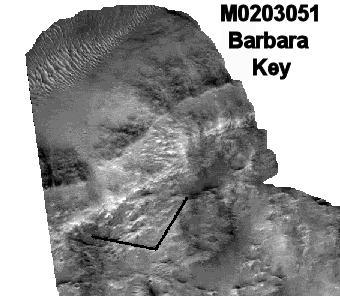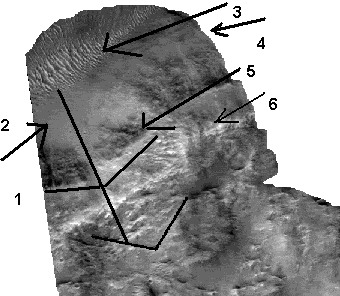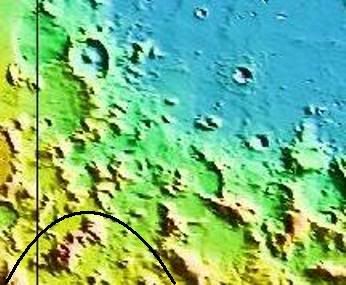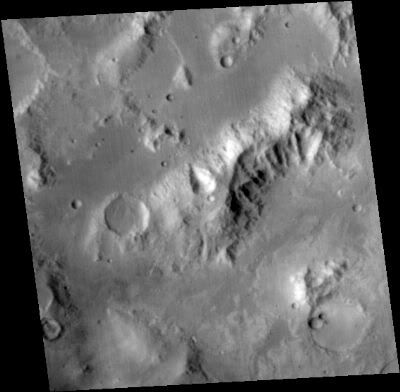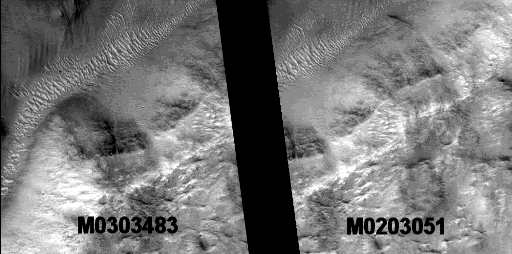- Thank you received: 0
Faces from the Chasmas
- neilderosa
-
- Offline
- Platinum Member
-

Less
More
18 years 8 months ago #9073
by neilderosa
Replied by neilderosa on topic Reply from Neil DeRosa
<blockquote id="quote"><font size="2" face="Verdana, Arial, Helvetica" id="quote">quote:<hr height="1" noshade id="quote">Does it matter to you that, when you cannot provide objective criteria, that tends to turn off many (most?) people and discourage further study? [Tom}<hr height="1" noshade id="quote"></blockquote id="quote"></font id="quote">
I don't like point-counterpoint debates but I'll try to answer this one and make a few additional comments. This seems like a loaded question to me because a) of course I'd like to make convincing presentations, but b) we can in no way judge the success of such an endevor by the very few participants in this board. And c) I think I am being objective, albeit not in a strict methodical sense you mean. I always point out the features and the details I am looking at. I make keys when the details are not obvious or the background is distracting. I look for corroberating evidence and higher resolution imaging when it is available, and I otherwise try to explain what I see. And I demand of myself a certain threshold for possible artificiality to be considered, the details of which I have explained many times.
With all due respect I'd like to ask the rhetorical question here of how what I'm doing differs quantitatively and qualitatively from, for example, the dolphin Emanual keeps posting from your slide show, and for that matter almost all of the entres in the slide show. They all seem to be there for the sole reason that they "look like" something familiar to us. (Incidentally I have no problem with that concept, but what's good for the goose is good for the gander).
It does not do to say that "such shapes do not occur normally in nature." Because as you have explained many times, that still amounts to an aposteriori argument. Only when predictions are made in advance, apriori, and later are successfiully fulfilled or realized do we come up to the standards you rightly demand as a confirming scientific proof. But preliminary evidence is necessary also, also the workings of a rational mind.
Neil
I don't like point-counterpoint debates but I'll try to answer this one and make a few additional comments. This seems like a loaded question to me because a) of course I'd like to make convincing presentations, but b) we can in no way judge the success of such an endevor by the very few participants in this board. And c) I think I am being objective, albeit not in a strict methodical sense you mean. I always point out the features and the details I am looking at. I make keys when the details are not obvious or the background is distracting. I look for corroberating evidence and higher resolution imaging when it is available, and I otherwise try to explain what I see. And I demand of myself a certain threshold for possible artificiality to be considered, the details of which I have explained many times.
With all due respect I'd like to ask the rhetorical question here of how what I'm doing differs quantitatively and qualitatively from, for example, the dolphin Emanual keeps posting from your slide show, and for that matter almost all of the entres in the slide show. They all seem to be there for the sole reason that they "look like" something familiar to us. (Incidentally I have no problem with that concept, but what's good for the goose is good for the gander).
It does not do to say that "such shapes do not occur normally in nature." Because as you have explained many times, that still amounts to an aposteriori argument. Only when predictions are made in advance, apriori, and later are successfiully fulfilled or realized do we come up to the standards you rightly demand as a confirming scientific proof. But preliminary evidence is necessary also, also the workings of a rational mind.
Neil
Please Log in or Create an account to join the conversation.
- tvanflandern
-
- Offline
- Platinum Member
-

Less
More
- Thank you received: 0
18 years 8 months ago #16198
by tvanflandern
Replied by tvanflandern on topic Reply from Tom Van Flandern
<blockquote id="quote"><font size="2" face="Verdana, Arial, Helvetica" id="quote">quote:<hr height="1" noshade id="quote"><i>Originally posted by neilderosa</i>
<br />With all due respect I'd like to ask the rhetorical question here of how what I'm doing differs quantitatively and qualitatively from, for example, the dolphin Emanual keeps posting from your slide show, and for that matter almost all of the entres in the slide show. They all seem to be there for the sole reason that they "look like" something familiar to us. (Incidentally I have no problem with that concept, but what's good for the goose is good for the gander).<hr height="1" noshade id="quote"></blockquote id="quote"></font id="quote">The three recognized criteria for artificiality are (1) a priori prediction, (2) a priori relationship, and (3) a priori context. The "dolphin" fits into the "scene" hypothesis in which the numerous images at Cydonia are divided into a mamalian area, an aviary, an aquatic area, and an insect area. There may be others. The dolphin appears in the aquatic area along with numerous other things that might be seen underwater. So it fits into an a priori context with an a priori relationship to its neighbors.
I'll really try to get that paper posted soon, as I promised earlier. But it has not been easy to find the needed time recently.
<blockquote id="quote"><font size="2" face="Verdana, Arial, Helvetica" id="quote">quote:<hr height="1" noshade id="quote">But preliminary evidence is necessary also, also the workings of a rational mind.<hr height="1" noshade id="quote"></blockquote id="quote"></font id="quote">The "first family" and related features held out the prospect for a possible mural or scene also, with numerous characters interacting in some meaningful way. But it never reached the stage where an a priori context or relationships could be established so that every subsequent finding would be a confirmation instead of an independent a posteriori feature.
Once again, your work is valuable. It holds out the hope that some meaningful context or relationship may eventually be discovered, or perhaps some surprising new evidence of functionality. But until we cross that a priori threshold, it is not accumulating evidence of artificiality. And the detached, dispassionate scientist must continue to entertain all plausible working hypotheses, including the one that many of these features are just pareidolia ...
... unless, of course, you can come up with some new criteria that are objective rather than subjective. Your latest image "Barbara" is a good example to discuss for objectivity because I don't see any trace of her on my monitor despite your detailed instructions. -|Tom|-
<br />With all due respect I'd like to ask the rhetorical question here of how what I'm doing differs quantitatively and qualitatively from, for example, the dolphin Emanual keeps posting from your slide show, and for that matter almost all of the entres in the slide show. They all seem to be there for the sole reason that they "look like" something familiar to us. (Incidentally I have no problem with that concept, but what's good for the goose is good for the gander).<hr height="1" noshade id="quote"></blockquote id="quote"></font id="quote">The three recognized criteria for artificiality are (1) a priori prediction, (2) a priori relationship, and (3) a priori context. The "dolphin" fits into the "scene" hypothesis in which the numerous images at Cydonia are divided into a mamalian area, an aviary, an aquatic area, and an insect area. There may be others. The dolphin appears in the aquatic area along with numerous other things that might be seen underwater. So it fits into an a priori context with an a priori relationship to its neighbors.
I'll really try to get that paper posted soon, as I promised earlier. But it has not been easy to find the needed time recently.
<blockquote id="quote"><font size="2" face="Verdana, Arial, Helvetica" id="quote">quote:<hr height="1" noshade id="quote">But preliminary evidence is necessary also, also the workings of a rational mind.<hr height="1" noshade id="quote"></blockquote id="quote"></font id="quote">The "first family" and related features held out the prospect for a possible mural or scene also, with numerous characters interacting in some meaningful way. But it never reached the stage where an a priori context or relationships could be established so that every subsequent finding would be a confirmation instead of an independent a posteriori feature.
Once again, your work is valuable. It holds out the hope that some meaningful context or relationship may eventually be discovered, or perhaps some surprising new evidence of functionality. But until we cross that a priori threshold, it is not accumulating evidence of artificiality. And the detached, dispassionate scientist must continue to entertain all plausible working hypotheses, including the one that many of these features are just pareidolia ...
... unless, of course, you can come up with some new criteria that are objective rather than subjective. Your latest image "Barbara" is a good example to discuss for objectivity because I don't see any trace of her on my monitor despite your detailed instructions. -|Tom|-
Please Log in or Create an account to join the conversation.
- neilderosa
-
- Offline
- Platinum Member
-

Less
More
- Thank you received: 0
18 years 8 months ago #16088
by neilderosa
Replied by neilderosa on topic Reply from Neil DeRosa
Your latest image "Barbara" is a good example to discuss for objectivity because I don't see any trace of her on my monitor despite your detailed instructions. -|Tom|-
That's very interesting, you didn't even see the noise reduction version? I didn't see it either for a long time, and then once it popped out on me it became indelibly fixed in my mind. I'm paraphrasing one of your comments re: our Family mosaic. That was also what happened to me in the case of the "spool thread art" mural I saw in Woodstock, mentioned above. To paraphrase my brother, can my imagination really be that elaborate? (To me, Barbara has a more than passing resemblance to a young Streisand--3 million years of erosion aside.) I thought Barbara was so obvious she didn't need a key, but now I know I should make one for her.
But I really do appreciate your constructive feedback.
Neil
p.s. speaking of monitors, I'm no technoguy but I have one of these new TFT LCD flat panel monitors, and I see everything about twice as well as on my big one at work.
That's very interesting, you didn't even see the noise reduction version? I didn't see it either for a long time, and then once it popped out on me it became indelibly fixed in my mind. I'm paraphrasing one of your comments re: our Family mosaic. That was also what happened to me in the case of the "spool thread art" mural I saw in Woodstock, mentioned above. To paraphrase my brother, can my imagination really be that elaborate? (To me, Barbara has a more than passing resemblance to a young Streisand--3 million years of erosion aside.) I thought Barbara was so obvious she didn't need a key, but now I know I should make one for her.
But I really do appreciate your constructive feedback.
Neil
p.s. speaking of monitors, I'm no technoguy but I have one of these new TFT LCD flat panel monitors, and I see everything about twice as well as on my big one at work.
Please Log in or Create an account to join the conversation.
- neilderosa
-
- Offline
- Platinum Member
-

Less
More
- Thank you received: 0
18 years 8 months ago #16320
by neilderosa
Replied by neilderosa on topic Reply from Neil DeRosa
Here's another key showing Barbara's features in more detail.
1) symetry lines for high cheekbones and eyeline (horizontal), and forehead through well shaded nose to damaged chin (verical).
2) clean, large, homo sapiens forehead.
3) "part" line for hair, which is also ripple at bottom of dry river bed.
4) inverted Crownface's chin line doubles as outine for Barbara's head at that point.
5) well defined eye with iris, outline, and eye socket, other eye damaged but both eye sockets are in precisely the right place for a human.
6) wavy hair.
Neil
1) symetry lines for high cheekbones and eyeline (horizontal), and forehead through well shaded nose to damaged chin (verical).
2) clean, large, homo sapiens forehead.
3) "part" line for hair, which is also ripple at bottom of dry river bed.
4) inverted Crownface's chin line doubles as outine for Barbara's head at that point.
5) well defined eye with iris, outline, and eye socket, other eye damaged but both eye sockets are in precisely the right place for a human.
6) wavy hair.
Neil
Please Log in or Create an account to join the conversation.
- neilderosa
-
- Offline
- Platinum Member
-

Less
More
- Thank you received: 0
18 years 8 months ago #9077
by neilderosa
Replied by neilderosa on topic Reply from Neil DeRosa
To do this research with any hope of success, one must accept the fact that the human mind can imagine faces where they don't in fact exist, either as a real flesh and blood face or an intellegent (artificial) rendition of one. One must also accept the fact that many faces are real (like yours and mine, and the ones on Mount Rushmore). I am pretty sure that both kinds exist on Mars.
Here is another example of the imaginary kind. First I post a high magnification crop of a MOLA "mercat" image. I'll call him "Big Face." He is around 15-20 km wide and is located around 279.5W 1.5N, near "Crownface." This image is reminiscent of those first sightings of the Cydonia Face back in 76. But unlike Cydonia, he's not real. He is on the lower left, in the semi circle.
Now here is low resolution M0400442 at the same coordinates. Even at this low definition, (242 m/p), it is fairly obvious that this is just a mountain.
Neil
Here is another example of the imaginary kind. First I post a high magnification crop of a MOLA "mercat" image. I'll call him "Big Face." He is around 15-20 km wide and is located around 279.5W 1.5N, near "Crownface." This image is reminiscent of those first sightings of the Cydonia Face back in 76. But unlike Cydonia, he's not real. He is on the lower left, in the semi circle.
Now here is low resolution M0400442 at the same coordinates. Even at this low definition, (242 m/p), it is fairly obvious that this is just a mountain.
Neil
Please Log in or Create an account to join the conversation.
- neilderosa
-
- Offline
- Platinum Member
-

Less
More
- Thank you received: 0
18 years 8 months ago #16089
by neilderosa
Replied by neilderosa on topic Reply from Neil DeRosa
Now back to Barbara, which I believe to be a real possible "Marsglyph" (new coined word).
I found a corroborating image for this 2km wide face. Had I made the right predictions, which I didn't, they may have been succesfully fulfilled. Here's a composite with the two narrow angle images containing this face, M0203051 (with the inverted Crownface), and the new addition, M0303483, offset around 1km to the west. Resolution of the new image is a little better (4.33 m/p for M03, to 5.78 m/p for M02). You can now see, the west outline of the face, and a hair/hood section on this newly revealed side. Also if you back up a little you can almost see a Mona Lisa smile. If we need a key for this one please let me know.
Neil
I found a corroborating image for this 2km wide face. Had I made the right predictions, which I didn't, they may have been succesfully fulfilled. Here's a composite with the two narrow angle images containing this face, M0203051 (with the inverted Crownface), and the new addition, M0303483, offset around 1km to the west. Resolution of the new image is a little better (4.33 m/p for M03, to 5.78 m/p for M02). You can now see, the west outline of the face, and a hair/hood section on this newly revealed side. Also if you back up a little you can almost see a Mona Lisa smile. If we need a key for this one please let me know.
Neil
Please Log in or Create an account to join the conversation.
Time to create page: 0.285 seconds

